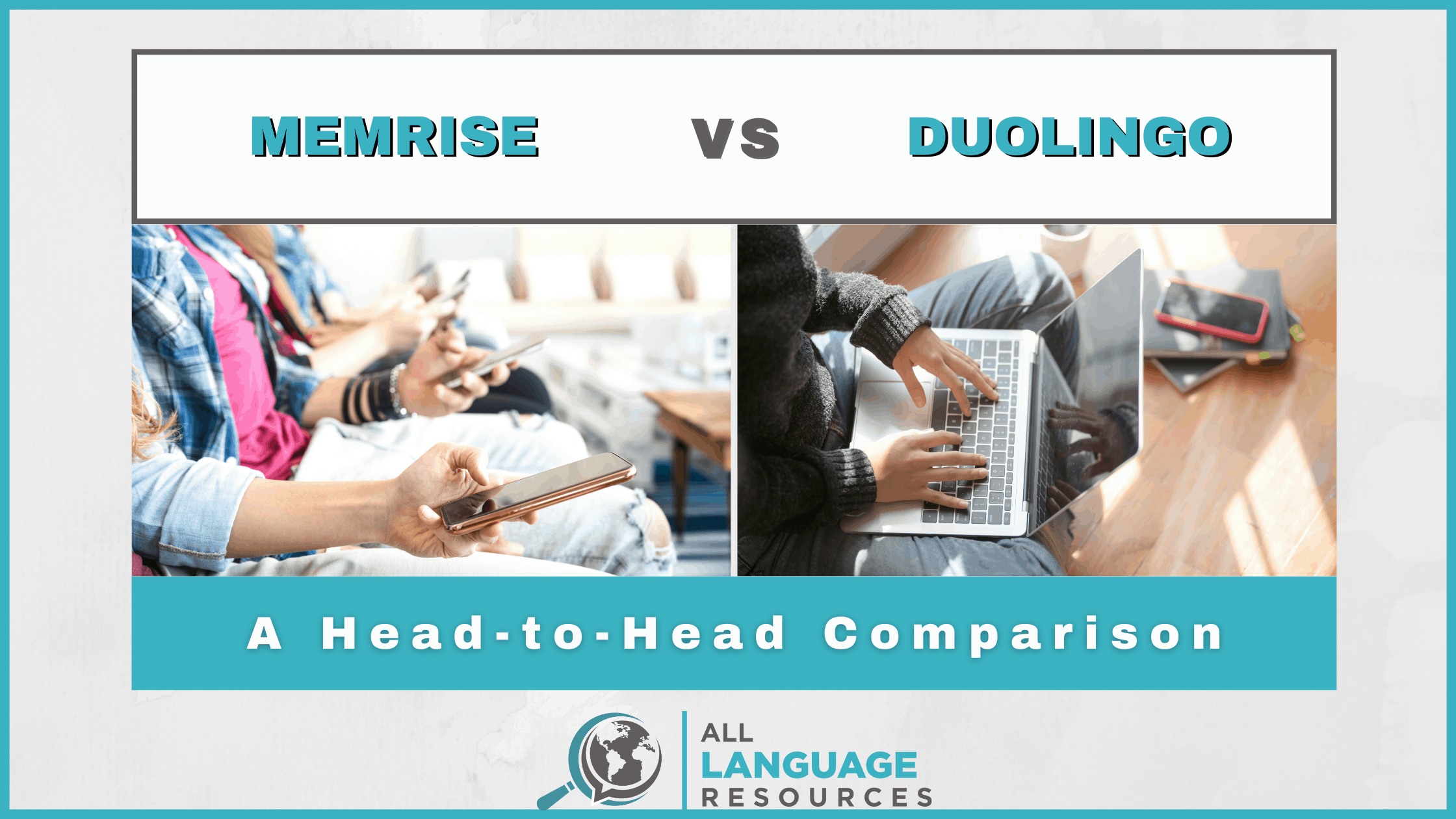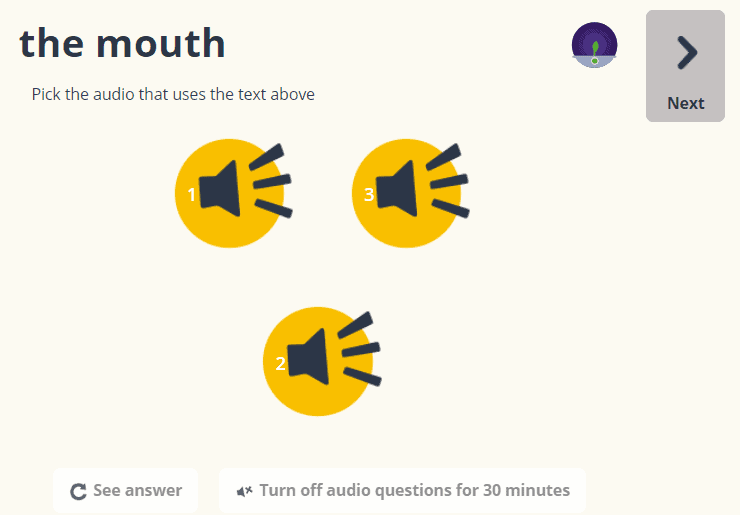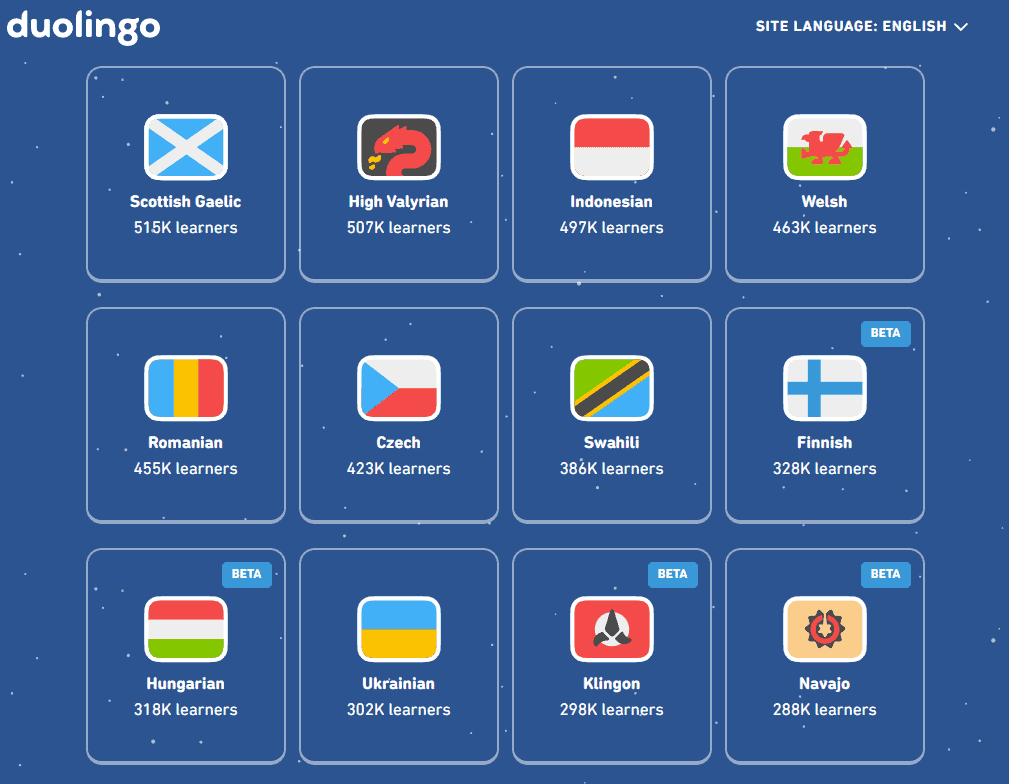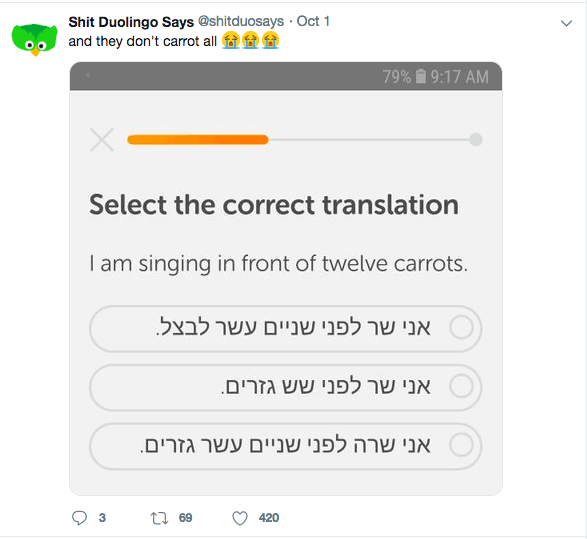Italian Phrase Super Easy Barely an Inconvenience


Memrise and Duolingo are two companies that have made language learning much more accessible to people all over the planet.
A ridiculous number of people use these platforms to study. Duolingo has over 300 million users, while Memrise has over 35 million of their own.
They've made a mark on the world of language learning largely due to the fact that they're free to use. While both platforms do have a premium subscription option, most users will find more than enough value in the free versions.
If you want to start learning a language but aren't sure which one to go with, I'll help you figure that out here.
The truth is, it's not actually an either/or decision. These two platforms teach languages in completely different ways that complement each other very well.
Memrise is very good with the same things Duolingo struggles with. Likewise, Duolingo can help fill in the gaps where Memrise is a bit weaker.
Memrise is much better for learning and remembering individual words or phrases.
Duolingo is much better for learning how to construct sentences.
I love how both platforms make it super easy to get started and do a little bit each day. The fact that they're available to everyone regardless of their financial situation is amazing.
Both are better for casual learners. These platforms are perfect for those who are just curious or want a low-risk way to try studying a language.
More serious students, such as those who need to learn a language for work or are planning to live abroad, would be better off using other resources. Unfortunately, that may cost some money – though not necessarily a lot.
For those students, Memrise remains pretty useful as a complementary resource, whereas it'd be better to replace Duolingo with a different, more thorough, course.
For now, let's take a look at what it's like to study with each of these platforms.
Memrise
You can read our full, in-depth review of Memrise here.
Memrise is basically a platform that teaches languages through flashcards. That sounds pretty boring, but it's actually a lot more fun than you might expect.
There are lots of courses available for tons of languages. Obviously, the more popular languages have more courses, but pretty much every language you can think of will have some courses.
There are even courses for Dothraki, Morse Code, and a bunch of languages I've never heard of. Memrise isn't exclusively for language learners, either; you can also study topics like history, math, science, and more.

There really are a ton of different courses on Memrise, and they vary significantly. This is because the vast majority of courses are added by users.
So, the quality and content change from course to course. This can sometimes be frustrating as some courses aren't so great, but it's made up for by the fact that you can find really unique topics.
For example, if you're studying Korean, you can find courses based on popular textbooks, about Korean slang, grammar, K-Pop, and much more. In addition to these options, you also have the Memrise created courses which are a bit more clearly structured.
So, while Memrise is best for learning vocabulary, it can also be used for other topics.
As I mentioned, Memrise teaches using flashcards. But, there's more to them than the old-school ones you may have used in high school.
Their flashcards use a spaced repetition system (SRS). The simplest way to describe this is that when you answer a question correctly, you'll see that card come up less often. The more often you get it correct, the longer the duration will be until you see it again.
Similarly, the cards you struggle with most will reappear more frequently. If you keep making mistakes with a particular word or phrase, that card will keep showing up.
This method is an efficient way to commit new words to long-term memory.

Studying with flashcards may sound dreadfully dull, but Memrise does a good job of making it more fun. They incorporate game-like elements, nice graphics, points, stats, timers to make you answer quickly, and other things to help keep you going.
They also use something called "mems" to help you remember words. They're mnemonic devices – often pictures or some words to make it easier to remember the word you're learning.

Usually, other users will have already added some, or you can add your own. They may seem kind of stupid, but they'll help you remember the words.
After being introduced to a new word, there are several different ways in which you'll be tested on that word. These including, multiple-choice, listening, and writing exercises.

Memrise Pros and Cons
Pros:
- Free
- Great for memorizing vocabulary
- Wide variety of languages and courses
- Game elements make it more fun than traditional flashcards
- Quick to get started
Cons:
- Quality of courses can vary
- Not great for learning sentence structures or grammar
- Needs to be used with other resources

Duolingo
You can read our full, in-depth review of Duolingo here.
Duolingo isn't as good as Memrise for teaching vocabulary, but it's far better for teaching the language as a whole. With Duolingo, you'll get more practice forming sentences and will likely gain a better understanding of the language.
It's more similar to a typical course, with lessons starting from the beginning and moving up to somewhere around a lower-intermediate level.
There's also a lot more consistency in the lessons. There isn't any user-created content, so you'll find that everything fits together nicely.
Duolingo offers courses in over 30 languages, including High Valyrian, Navajo, and Hawaiian.

Each course consists of a bunch of different lessons organized by topic. The lessons don't really have explanations like you may expect. Instead, you're sort of just thrown into it and have to start answering questions.
It's generally pretty easy though. For example, you'll be introduced to some vocabulary by matching the word to a picture.

Later on, you'll be given sentences in English and need to translate those sentences. Although they may use words that you've never learned, if you do get confused, you can just click on the word to see a translation.

Other times, there will be multiple-choice questions.

The lessons all follow a similar format to this and can be completed very quickly. You get rewards, points, streaks, achievements, and some other things to help motivate you to study.
In fact, I think that's Duolingo's biggest strength: it takes people who may be intimidated by studying a language and gets them to do to a little bit each day. Memrise also excels at this.
For the most part, there aren't a lot of explanations. But, some languages have a nice Tips section which gets into grammar a bit more.

One thing that can get pretty frustrating with Duolingo is the audio for the sentences. Individual words usually sound fine, but while you're completing exercises you'll often hear full sentences.
In most (or all?) languages, words used in isolation sound quite a bit different than when they're used within a sentence. So, since none of the sentences were recorded together, it's just a mashup of individual words. This creates very awkward-sounding sentences.
Another common complaint is that Duolingo often teaches nonsensical sentences. So, you may end up learning things that you'll never say in real life. There's even a Twitter account to document some of these.

Duolingo Pros and Cons
Pros:
- Free
- Great at getting people to study a little every day
- Clear course structure
- Teaches you how to construct sentences
- Quick to get started using
Cons:
- Covers a lot of content but isn't the most thorough
- Nonsensical sentences
- Sentence recordings often sound strange
- Can be very bad for languages that don't use the Latin alphabet
Should you upgrade to Duolingo or Memrise's premium plans?
Lots of apps offer very limited free versions and then require you to upgrade to a paid plan to get reasonable practice out of it. Both Duolingo and Memrise are the exception to this — they offer a ton of value for free.
Let's look at what's included in their premium plans…
Memrise Pro:

Memrise Pro starts at $9/mo, but the monthly price falls significantly if you purchase an annual plan, though the annual price in the image above is discounted. Recently they have been rolling out more features in the plan. Previously I didn't think it made much sense to use Memrise pro, but now it could be worth trying for one month to see if you like it.
The extra features include:
- Grammarbot
- Chatbot
- Immersive videos with native speakers
- In-depth analytics
- Offline learning
Some of the features aren't available in every language, so you'll want to check to see what's included in the language you study before subscribing.
Duolingo Plus:

Duolingo Plus costs $12.99/mo and falls to $6.99/mo if you purchase the annual plan. Unlike Memrise Pro, where there are a lot of extra features included, Duolingo Plus doesn't give you access to much else.
With Duolingo Plus, you can:
- Remove ads
- Download lessons on mobile
- Get a free streak repair each month
Perhaps the best reason to subscribe to Duolingo Plus is if you love their mission to make language learning more accessible and want to support them.

Alternatives to Memrise and Duolingo
There are a lot of other resources that you could use to study a language. Some of which are quite similar to both of these platforms, and others that are completely different.
Anki
Memrise and Anki are very similar – both are applications that specialize in providing practice with flashcards. Memrise is much easier for beginners to jump right into. Its interface is much prettier, and it's more fun to use. Anki, on the other hand, is much more DIY. You can customize pretty much everything. While some people swear by it, others find it to be inconvenient to have to add everything themselves. Fortunately, there are also user-created decks for those that aren't interested in spending the time to create their own.
Babbel

Babbel is somewhat similar to Duolingo, except for the fact that it's a bit less game-like and takes a more in-depth approach to teaching grammar. Whereas Duolingo teaches almost exclusively through exercises, Babbel makes use of plenty of explanations. While it's not free, it's still one of the more affordable courses around. Review.
Clozemaster
Clozemaster has an old-school video game feel to it. Compared to both Duolingo and Memrise, it's much better at teaching words in context. You'll be given sentences and need to fill in the missing word, either by typing it in or choosing the multiple-choice option. Some people find it really useful, and most features are available for free. Review.
Other Courses
There are so many other courses to consider that I could never list them all here. It'd be impossible because the best courses are different for every language. For example, HelloChinese is basically a better version of Duolingo for Mandarin, Baselang is really good for Spanish, smarterGerman is great for German, and so on.
For our top recommendations, all our ratings, and a huge list of resources for each individual language see the table below.
MOST RECOMMEND RESOURCES BY LANGUAGE
Final Thoughts
Memrise and Duolingo are two of the best resources to introduce you to learning a language. They excel and simplifying things, making it possible for anyone to get into the habit of studying a little bit each day.
One great thing about these two platforms is that they teach languages in completely different ways and focus on different aspects of language learning. There's no need to choose between the two — they work very well when used together.
For anyone who's kind of interested in learning a language but not yet ready to dedicate the necessary amount of time to become fluent, I'd highly recommend trying out both Duolingo and Memrise.
There's also no need to decide how seriously you want to take studying a language right away. Start out with Duolingo and/or Memrise and see if you enjoy studying. If you do, you can look for additional materials later on.
But, if you know that you're willing to put quite a bit of time into learning a language and are ready to commit, I wouldn't recommend using Duolingo. There are other courses that explain things better and will be more effective, though you'll likely have to pay some money.
Even serious students may find that it makes sense to use Memrise as a first introduction to the language. You could quickly learn the most common words in the language and give yourself a solid foundation going forward.
Regardless of what you decide to do, have fun doing it.
Learning a language doesn't have to cost money.
Sign-up to get a huge list of free resources tailored to the language you're studying.
[contact-form-7 id="11784″]
We won't send you spam. Unsubscribe at any time.
Source: https://www.alllanguageresources.com/memrise-vs-duolingo/
0 Response to "Italian Phrase Super Easy Barely an Inconvenience"
Post a Comment